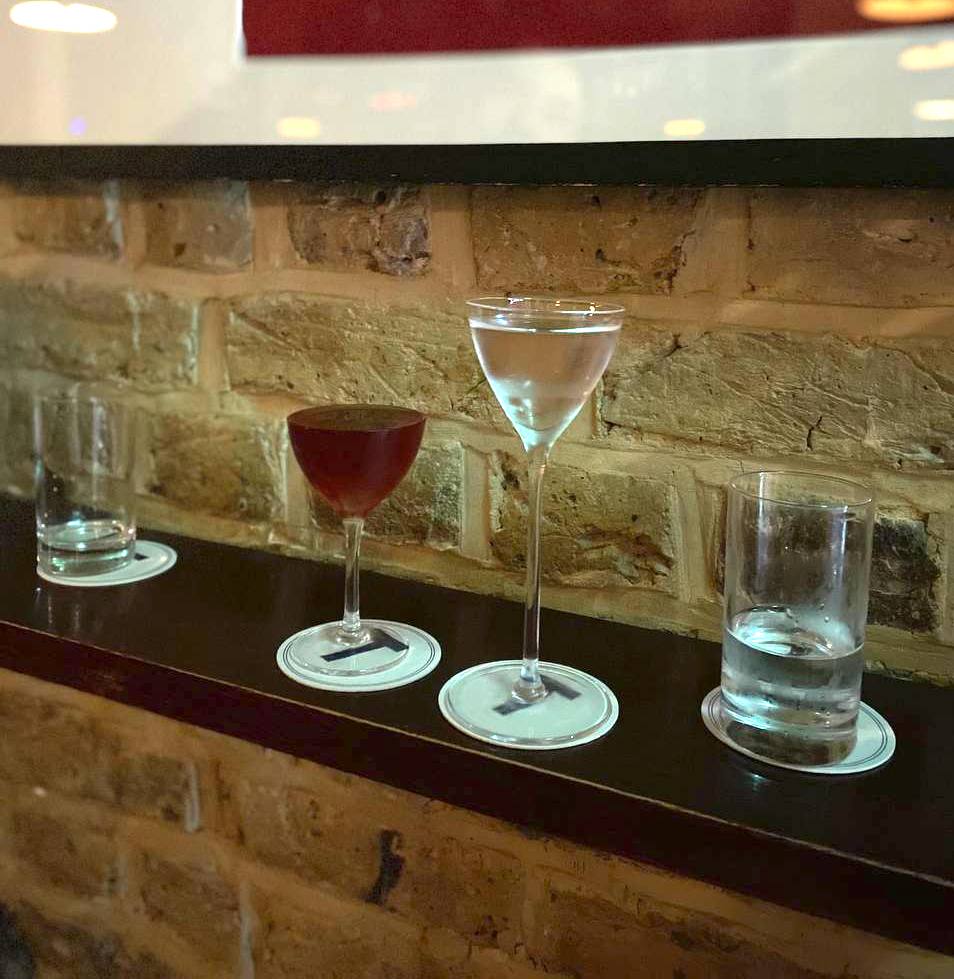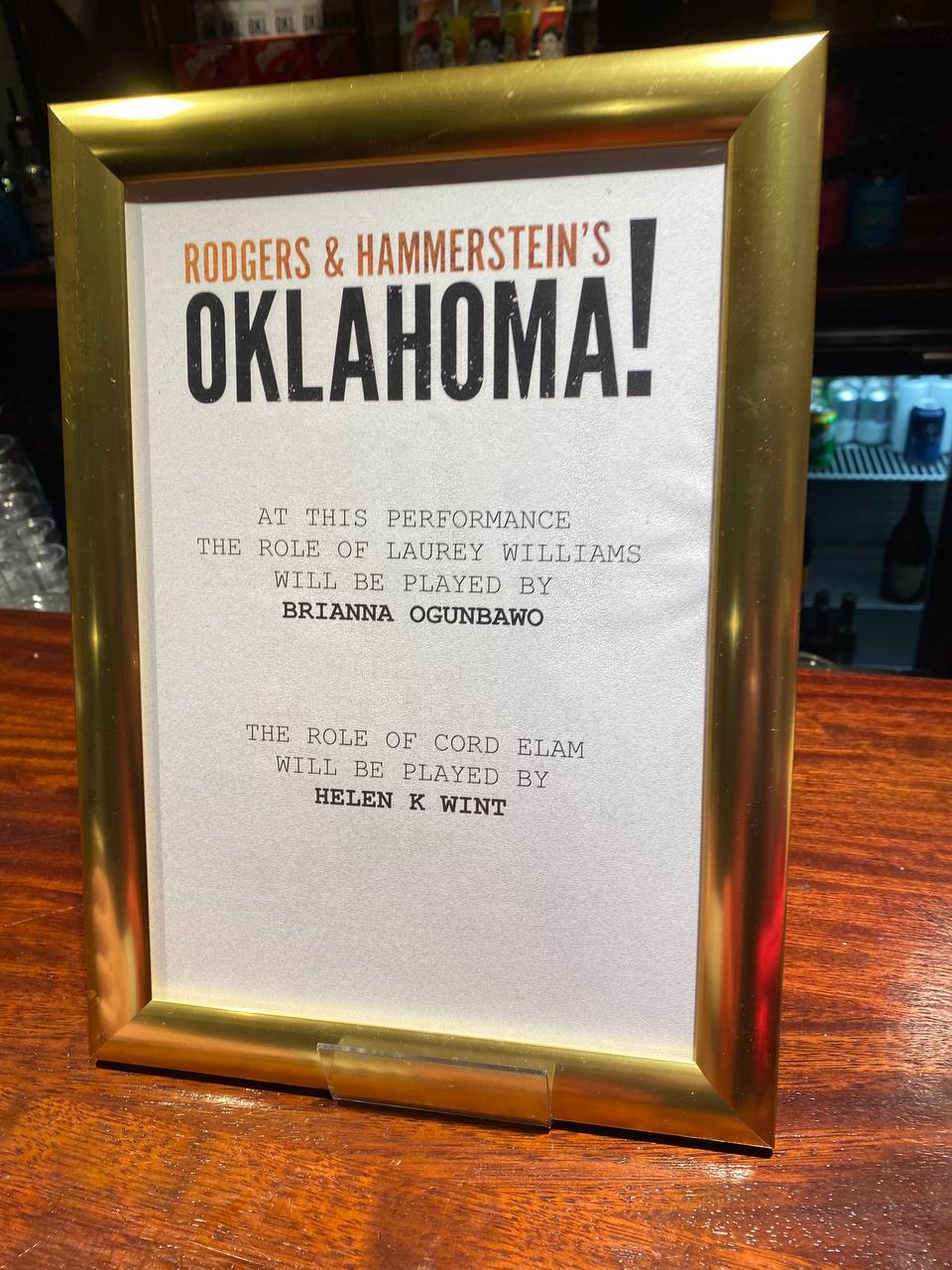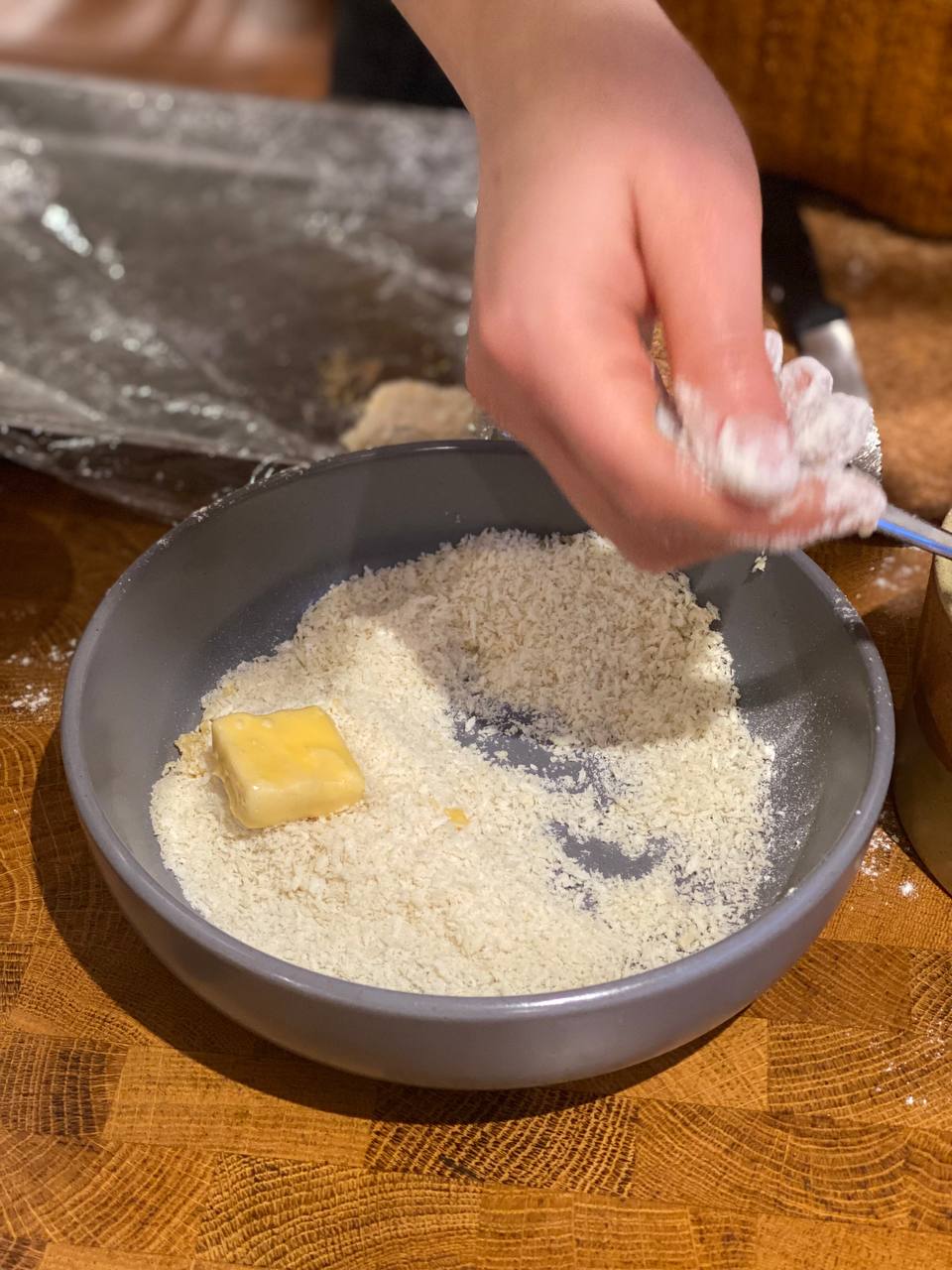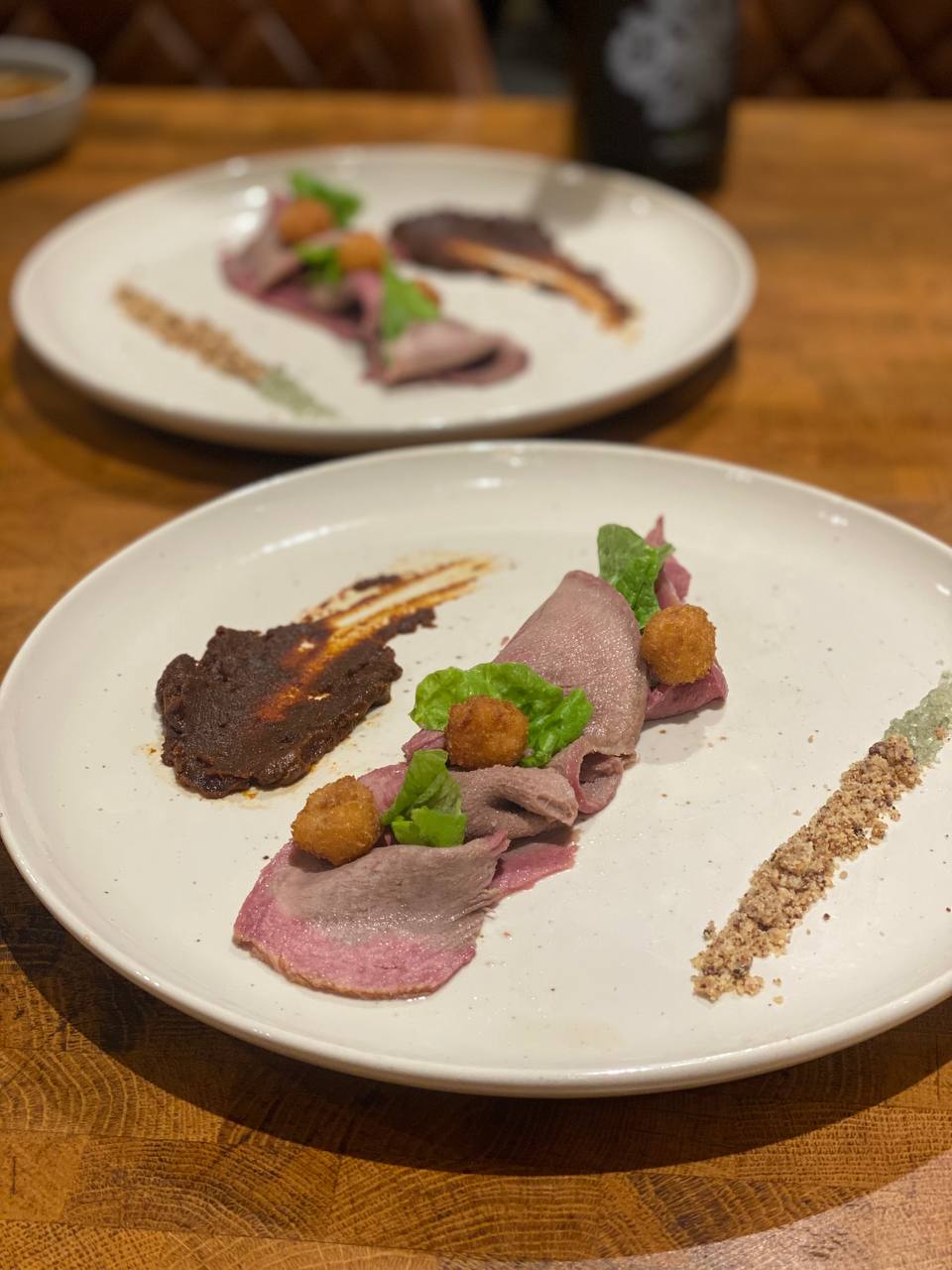#140
On traveling without travel
I enjoy places where I could walk-in without a reservation, sit at the bar, talk with people without raising my voice, order drinks off the menu, and lazily converse with bartenders about rotovap specs.
Termini is the complete opposite: one needs to queue or book weeks ahead, it's always loud, the menu has six drinks (three of which are essentially the same), and the bartenders are too busy to say anything.
And yet, I love it: probably because their atmosphere transports you to a busy bar at an Italian railway station somewhere in the north of the country where people know how much their time is worth. And the moment you make a sip of your ice cold clay distillate you feel how the heat of the mid-day sun is dissipating in the air.

And then you remember that it's March in London, and there is no sun because it's an evening, and you're nearly late for the Oklahoma the musical, which I've seen only once before, in a different country and way younger, but loved a lot. And the musical didn't disappoint, by the way, albeit looked very similar to the one staged by some theatre school students more than a decade ago.

On a different topic, I've got to watch how one might deep-fry mayo:

While a fun exercise on its own, this was plated with pickled beef tongue, tomato molasses and onion crumble:

Pretty cool I must say, and somewhat very British as well.
Enjoying this? Get Tuesday Triage in your inbox every week.
Things I enjoyed reading
1. The caff is one of Britain’s cultural treasures – but if we don’t eat in them, they’ll disappear by Isaac Rangaswami
My first trip to London was in 2015: I didn't know much about the country despite numerous English lessons, but I was pretty sure I couldn't leave England without trying the English breakfast, so I listened to people way smarter than me and went to a small cafe with bold white letters proudly displayed on black tiles.
Step inside and you’ll find a dramatic dining room. Gingham curtains line the windows, oxblood linoleum covers the floors, the rest is all laminate tables and beautifully brown fixed seating. But most people are here for the fry-ups, or things such as liver, gammon, and bread-and-butter pudding. Five miles across town at E Pellicci, another famous art deco spot, you’ll encounter a similar brand of Italo-cockney hospitality and enough intricate wood panelling to furnish a library.
The Regency today seems to be precisely the same as nearly a decade ago, and something tells me that it didn't look much different almost eighty years back when it just opened. I still remember my first English breakfast though, and that somehow remarkably proves the author's point: caffs need to stay, and that's mostly our responsibility.
2. How an electrical engineer solved Australia's most famous cold case by Derek Abbott
I wrote about the Somerton Man a few years ago, wondering if we will ever learn his story, and here we are: someone finally managed to put all pieces together and solve the puzzle.
And so, when Astrea retrieved the 2 million SNPs, the company didn’t rely on the traditional framework for DNA-sequencing reads. It used a completely different mathematical framework, called imputation. The concept of imputation is not yet fully appreciated by forensics experts who have a biological background. However, for an electronics engineer, the concept is similar to error correction: We infer and “impute” bits of information that have dropped out of a received digital signal. Such an approach is not possible with a few STRs, but when handling over a million SNPs, it’s a different ball game.
It's hard to appreciate how technologies evolve unless you either closely interact with them, or on the contrary, don't follow the news for a while and then compare the state of the union. The last time I closely looked at DNA-sequencing was in 2017, and seems like in five years a lot has happened.
3. What was the Impact of Julius Caesar’s Murder? by History Today
Lots of things we learn about at history lessons come as mere facts and don't prompt further discussions (or maybe I was just unlucky). This one is interesting though, and I am pretty sure there must be at least one movie out there answering the question in a more creative way.
The third impact was the realisation of a new reality. Caesar’s teenage adopted son took over where his father had left off. The power of a popular name to motivate soldiers and the poor left his killers amazed. Their attempt to fight under the banner of ‘Liberty’ and ‘Death to Tyrants’ ended in defeat. Caesar’s people had much less interest in these concepts than the intellectual aristocrats did.
Another good mental exercise would be to imagine how different the history might have been if Caesar were spared.
4. So You Want to Turn an Office Building Into a Home? by Emily Badger and Larry Buchanan
Despite some large companies summoning people back to offices the world has changed in 2020, and offices are becoming more and more redundant. As the result, more people turn back to (previously purely theoretical) ideas of converting office spaces into residential units.
And the economics of conversion make more sense with prewar buildings. Older offices have largely fallen out of favor with tenants who prefer modern amenities and large open spaces that can be easily reconfigured. That means the value of these buildings as offices has fallen low enough that in some locations they might now command higher rents as housing.
It’s an elegant circle of city life: The very qualities that have made these buildings outdated as offices now make them ideal candidates for apartments.
Unfortunately, judging by a few American examples, the current state of laws and taxes doesn't make it economically reasonable if the goal is to make affordable homes, but the article is worth reading through even if it's only for its visual details.
5. Who Is Still Inside the Metaverse? by Paul Murray
I am somewhat confused that this whole Metaverse hype died as quickly as it has started, leaving behind only a bunch of weak memes. Growing up with sci-fi books, I had very high hopes for the next decade of slow transition in the virtual world, and yet everything we have so far are avatars from Sims 2 and weird communities within fake landscapes. The author is trying to figure out if there is more to it:
Comedy is big in the metaverse, and the Soapstone Club is one of Horizon Worlds’ most popular destinations. That’s where I meet Okiedriver, who’s a producer at the club, meaning he helps out with events and explains to newcomers how the place works. Meta is reportedly striving for “almost Disney levels of safety” for its users, and the comedy here, he tells me, is resolutely family friendly. “Think about a 6 p.m. slot on regular TV,” he says. Turning to a billboard, he runs through the upcoming acts, saying encouraging things about each one: “Morknmindy, I recommend that very highly; you’ll laugh till you cry.”
Standups in the virtual world actually sound like fun: judging by people who listen to standup podcasts, the visual part doesn't matter much but gives nice control over the joke's context, as it might easily "fly" the audience into a specific location, or change the comic to fit into the narrative better.
Such a shame we're not at that stage yet.
6. Welcome to the Era of the Fake Six-Pack by Jeff Wilser
For more than a year I focus a lot on my gym routine, from dedicating two hours a day to weightlifting, to curating a bunch of suppliments, to cycling between cutting and bulking, but there are things that just don't happen no matter how much effort I put, and abs are the most stubborn of them.
No surprise some people give up after decades of exercise and maintaining a single-digit body fat percentage, and opt in for a surgery:
This is the blessing and curse of ab etching: It will last for life. “The nice thing about fat cells is that you don’t make new ones,” explains Markmann. Your fat cells will expand or shrink when you gain or lose weight, but lipsuction eliminates the cell itself. This means that the six-pack is here to stay, forever, which is good news if you stay trim. On the flip side, as Lakin puts it, “If you gain weight, you’re going to look stupid.”
Looking at the pictures, it is indeed hilarious to see people who went through ab etching and then gained weight: they look like ninja turtles but after a few very tough years. Hopefully I won't be regretting this paragraph a few decades later.
7. My restaurant has two Michelin stars. But I’d never dined in it. So I booked a table by Jordan Bailey
Aimsir is an Irish restaurant led by husband-and-wife team, and some of their dishes are worldwide famous, but there is always more to a restaurant than just the food on plates.
The balance of dishes, from one to the next, was exactly the way I intended. Noisewise, you could hold a private conversation but there was still a nice buzzy atmosphere (which also drowned out the hum of the kitchen extraction). I realised how little you actually notice of the set-up practices that eat me up on a daily basis, from the position of my spoon pot and check sheet on the pass to having all the copper sauce pots, garnish trays, food containers and plates stacked and organised symmetrically and at right angles. Even though it definitely doesn’t affect the overall experience, I couldn’t let this be any other way. It’s a chef thing, or something like that.
I haven't been to Aimsir yet, but I remember a lunch at Fhior in Edinburgh, where we've spotted the FOH team using rulers to make sure cuttlery is aligned properly on tables set for the guests. You know that when the team has time and energy for something like this, the rest of processes in and out of the kitchen are already fine-tuned to perfection.
8. My Startup Banking Story by @mitchellh
Once in a while I talk to my entrepreneur friends and whenever they mention that I "should start my own business" I can't help but laugh as the only benefit to running a startup seems to be the opportunity to sit one day, look back at the past and write down stories like this one:
He also subtly suggested I hire personal security or otherwise deposit those funds somewhere with haste. I believe his exact words were "if you lose that check, I can't help you." Again, this was a one time event, and I don't know how true that all is, but it was said to me.
A few days later, I walk into the branch (I did not hire personal security). I tell the teller my name and there is a flicker of immediate recognition. The teller guides me to a cubicle, the account is successfully closed, I'm issued a $1M cashier's check, and I walk out the door.
Don't get me wrong, people who create something from scratch instead of working for someone are the real heroes, I just can't imagine myself dealing with all the out-of-comfort-zone errands that come with the pure creating things process.
9. Kenji López-Alt Spent 5 Months Studying Chicago Thin-Crust Pizza. Here’s What He Learned by J. Kenji López-Alt
I often complain how good the old school Serious Eats website was, and mostly that's because there used to be long detailed articles on the simplest things (like how to make a cole slaw with a proper blind testing approach). This post by Kenji is the closest you could get to that OG feeling:
With the crust handled, I turned my attention to the sauce. In Chicago, pizza sauce tends to have an intensely savory flavor that comes from cooking down canned tomatoes heavily seasoned with dried herbs, like marjoram and oregano, and garlic (I like to use a combination of punchy fresh garlic and sweeter granulated garlic). Some sauces are very sweet; others lean more vinegary. You can adjust those elements to your own taste. These days, I don’t bother simmering the sauce first: I find that it develops plenty of that cooked flavor during the pizza’s 10-minute bake time, especially with the addition of tomato paste.
I am not a huge fan of thin-crust pizza though, so might as well get back to reading Modernist Pizza instead. Tempora mutantur, as they say.
10. The Worlds of Italo Calvino by Merve Emre
Despite not being well-versed in Italian writers I happened to know about Italo Calvino before: mainly for his stories within stories, somewhat similar to those of Jorge Luis Borges, but with a certain ironic vibe:
Italo Calvino was, word for word, the most charming writer to put pen to paper in the twentieth century. He was born a hundred years ago in Cuba, the eldest son of a wandering Italian botanist and her agronomist husband. Shortly after his birth, the family returned to Italy, where they divided their time between his father’s floriculture station, in the seaside town of San Remo, and a country home sheltered by woods.
Probably next time I decide to stop reading cookbooks, I should turn to one of these instead.
Did you know I make apps?

Lexie
A blob that dies if you don't practice. Guilt-driven language learning for French, Spanish, and German — but make it cute.
Take a look →Things I didn't know last Tuesday
1. California Bay Nuts
There is a tree in the States which leaves could be used as a substitute to bay, but it also bears fruits:
The flesh of bay nut husks are edible when ripe. The upper (stem) end of the nut is the best part. The flesh is similar to avocado, to which they are related. It is more of a nibble than a significant food though.
The actual nuts are edible as well but need to be roasted very well first as otherwise they might be poisonous.
2. En dash
I had a vague understanding between em dash and hyphen but somehow missed the whole "en dash" story completely:
Joins numbers in a range, such as “1993–99” or “1200–1400 B.C.” or “pages 32–37” or open-ended ranges, like “1934–”
Extra points to messengers that convert multiple dashes into the correct type automatically.
3. Oscar Nominees have to pay taxes for their free gift bags
That sounds like a first world problem but here we are:
Here's how Forbes breaks down the math: "At the 37% IRS tax rate, that’s $46,620. California-based stars will have to pay California’s up to 13.3% tax too, another $16k or so. That’s up to $63,378 in state and federal taxes."
Imagine landing your first award in decades for a non-profit documentary and then facing the taxes.
4. “Precision dairy” milk
This is a really interesting approach to cultivating dairy without using animals:
He hit upon a process called precision fermentation, similar to what has been used for decades to brew beer, make insulin for diabetic patients or produce rennet for cheese.
“Rather than using 22nd-century technology to produce meat, we’re using 20th-century technology to produce milk protein,” he said.
Personally I am very excited for the day when we will be able to synthesize meat and milk at home without the need to go to a farm, mostly because a fermentation tank takes less space than a cow.
5. High concentrations of cadmium and lead in dark chocolate
I got exposed to some 100% chocolate recently and am still traumatised by this experience, no surprise scientists actually advise against eating it.
The F.D.A. study found that dark chocolate had, on average, 7.6 micrograms of cadmium and 0.8 micrograms of lead per one-ounce serving, and some products had three or four times as much. (Milk chocolate, which contains less cocoa, had much lower concentrations.)
Compared with more than 300 other foods tested by the F.D.A. in a separate study, dark chocolate had the third-highest concentrations of both cadmium and lead, exceeded only by baking powder and cocoa powder for lead, and cocoa powder and sunflower seeds for cadmium.
That being said, the lowest lethal dose of Cd is 5 gr in a 70 kg man which is a lot of chocolate.
6. Why Americans Use Fahrenheit Instead of Celsius
I didn't know that Fahrenheit is an older system than Celsius. Now it makes more sense and also somewhat explains why people came up with a more convenient system in the first place:
Only 18 years after Daniel Fahrenheit’s breakthrough, another scientist named Anders Celsius developed a second system of temperature measurement and a much more intuitive one at that.
One needs to be rather stubborn to still stick to something so unintuitive for so long.
7. Venous air embolism
Apparently blowing air into the vagina might be lethal:
Venous air embolism is an infrequent complication of pregnancy but may occur if air is blown into the vagina during orogenital sex. Air passes beneath the fetal membranes and into the circulation of the subplacental sinuses, invariably causing death to both mother and fetus within minutes. Reported is the case of a nonfatal air embolism following vaginal air insufflation in the 38th week of pregnancy. The hospital course was complicated by hypotension, metabolic acidosis, acute neurologic changes, and emergency caesarean section with eventual fetal demise.
The research paper covers only pregnancy complication but I did lots of research and it actually a valid concern outside of pregnancy as well.
8. DINKWAD
A new hilarious abbreviation I came across:
The DINKWAD (double income, no kids, with a dog) lifestyle trend could be the new “American Dream” for Millenials and Gen Z.
Slightly surprised the millenials don't dream of cats anymore.
9. Iceland doesn't have McDonald’s for more than a decade
I don't know much about fast food chains in Iceland but didn't know that it had McDonald's before but the chain left the country when the ingredients prices went up.
McDonald’s opened its doors in Iceland in 1993. Then-Prime Minister Davíð Oddsson was the first to bite into a burger at the newly-opened joint. In October 2009, the chain announced that it would be closing its doors, with less than a week’s notice. The decision was attributed to the 2008 banking collapse, which had doubled the fast food restaurant’s expenses for meat, cheese and vegetables.
I guess it might happen to anyone at that point.
10. When to serve dim sums?
I was always confused by restaurants offering dim sums as a separate menu during lunch time but never for dinner, and I was even more confused when my friends took me to a dim sum place for breakfast in the States, but now it makes a bit more sense:
In China, dim sum is served as early as 5 a.m., whereas here in the States, it tends to be more of a brunch-type affair, although some restaurants offer dim sum through the dinner hours.
The article mentions that some server them at dinner hours but I am yet to find at least one place doing that in a non-ironic way.
Book of the week
I was hunting for Christina Mouratoglou & Adrien Carré's Mazi for a while, mostly because you'd rarely see a modern Greek cuisine cookbook, but also because the authors have a restaurant in Notting Hill for the past decade, and I never had the time to pay them a visit:
One could argue that peinirli is the Greek boat-shaped answer to pizza. Besides our version, you can follow the basic recipe to make the dough and then create lots of different fillings by combining any other ingredients you like. You can also play around with the size of the dough base, shaping it into lots of little boats that are even better for sharing.
Pastourma or soutzouki are Greek spicy cured meats, which you can source from Greek or Armenian and some Middle Eastern or Turkish delis, but if you can’t find them, use finely chopped bacon instead. Kasseri is a yellow hard Greek cheese available from whole-food stores and Greek delis, but you can substitute it with Manchego, Gruyère or mature Cheddar.
Some of the recipes sound surprisingly familiar to me, and some are borderline questionable (looking at you, Mojito Oysters), but overall I feel slightly underwhelmed with the book, probably because of my high expectations and hopes to find a nearly Michelin-style recipes that elevate Greek love for fresh ingredients, cheese and flaky pasties into refined dishes.
Maybe at least the restaurant is as good as people say?
Thank you and see you in a week
(or in a month)!
If you'd like to support the newsletter, please subscribe to the weekly plan. Otherwise you will keep receiving the letters on a monthly cadence – no need to do anything to opt-in.
If you have any questions, or want to suggest a link for the next newsletter, please drop me a message on Twitter or reply to this email.
Cheers! 🍸
Need help with iOS?
I spent a decade on FDA-regulated medical devices and apps with millions of users. Now I help teams ship MVPs, rescue messy architectures, and build the hard bits that don't fit in a sprint.
Learn more →